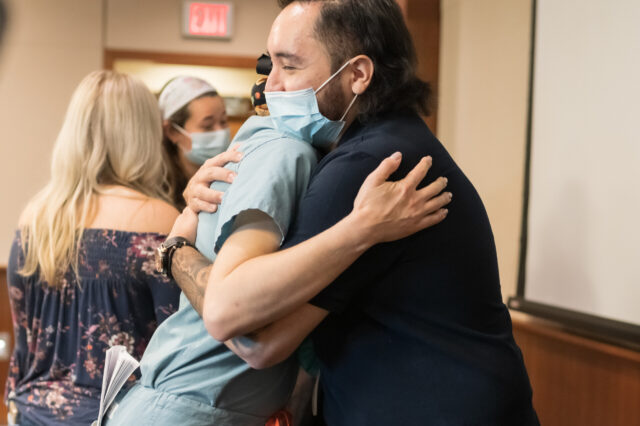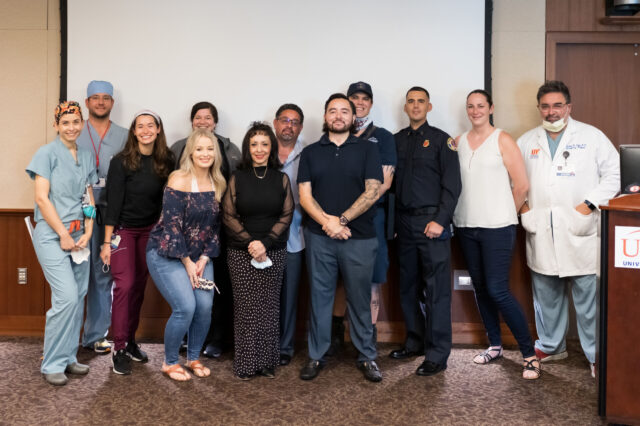Back From the Brink: How Matt Defied Death
Matt Benavidez can't recall how he ended up crumpled on a crosswalk on the night of Nov. 7, 2020. He has no memory of his motorcycle hitting an SUV or rescue crews attempting to save his life.
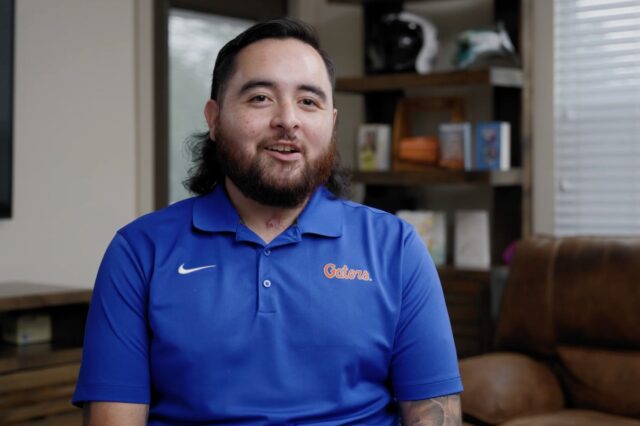
Matt Benavidez gazes at the exact spot in the road where he was pronounced dead. He stands at an intersection that’s ground zero for the collision between his gruesome tragedy and inexplicable triumph. As Matt’s eyes fix on the spot, his thoughts race like the cars speeding back and forth over the asphalt.
“It’s powerful in the sense that I get to pass by it every day alive and well, full-bodied, fully capable of doing anything I want, really. It kind of gives me the sense that I won,” Matt said. “I can come by here every single day knowing that I could have very well just been a memory down that road of someone that died right then and there, but I pass by it every single day like, ‘No. I get to drive you today. I get to cross you today.’”

How he ended up crumpled on that crosswalk on the night of Nov. 7, 2020 is something he can’t recount. Matt, then a 24-year-old University of Florida student, only recalls being on West University Avenue before everything went blank. He has no memory of his motorcycle hitting the right side of an SUV in the 1500 block near Chipotle Mexican Grill, and he has no account of Gainesville Fire Rescue and Alachua County Fire Rescue crews responding to attempt to save his life.
At 7:56 p.m., Matt was officially declared dead after suffering a litany of catastrophic injuries.
The violent crash gave the helmet-less rider a traumatic brain injury while fracturing his skull, sternum, three ribs, nose, jaw, right ankle and second vertebra, known as a hangman’s fracture. He also had excessive blood pooling in the frontal lobe on both sides of his brain, a collapsed right lung and a swollen cranial nerve that would make him see double in his right eye — which he nearly lost. Matt also sustained severe lacerations in the form of three deep scars on his forehead, and he cut his mouth so badly that the left side of his lip could touch his right earlobe.
Watching bystander footage of his mangled body lying motionless on the pavement as well as the contrasting chaos around it, doesn’t jog his memory. In fact, it makes the whole incident more difficult to comprehend.
“Seeing all those EMS surrounding me, I can’t put together that’s me. I see my bike destroyed, and I’m like, ‘That’s not me. There’s no way. How am I alive? How did I survive that?’” Matt said. “My bike is messed up. My bike is totaled. So if my bike is like that, what am I really like? So I just can’t wrap my head around it, and not because I don’t want to, not because I can’t accept it. It’s because I feel like I shouldn’t be here right now.”
By all experts’ accounts, he shouldn’t be, or at least not physically and cognitively functional. And in the immediate aftermath of his accident, while responders scrambled to save his life, Matt says he was somewhere very different.
The Golden Hour
“I was in a room, a four-wall room,” said Matt, describing his afterlife experience. “The wall that I was facing, the wall to my right and the wall behind me, I was in a morgue. All the bodies in the morgue, I knew them, but I couldn’t name them. I just couldn’t. And my left wall was an open spot to a place that is the most beautiful place I’ve ever seen. Ever."

Matt described the area to his left as having blue, clear skies and green, flowing grass. Nicely dressed individuals entered the room, and the fact that he didn’t recognize them didn’t make him feel any discomfort as they approached.
“They asked, ‘Do you want to come with us and make it easy on yourself or do you want to go back and work really, really hard?’”
It has become the question that has defined his life, his future. Matt chose the latter. Meanwhile, the city and county paramedics on scene had no choice.
They had one last resort as Matt’s pulse was nonexistent. A paramedic would need to establish an airway by performing a surgical cricothyrotomy, a procedure that’s like a tracheostomy but differs in that it’s done during emergencies. This would require a hollow tube to be inserted in the cricothyroid membrane of Matt’s neck.
The person to execute it would be GFR paramedic John Kalaf, but two things stood in the way of a successful cric. For starters, it would be the first such operation of Kalaf’s career. Plus, they were in the middle of a dark road.
The incision was made in Matt’s neck, and it immediately became evident that he had been choking on blood due to how much was released.
An airway was made. A faint pulse appeared.
Time was Matt’s enemy now. The golden hour, the name given to the span of time deemed crucial to saving critically injured patients, was ticking away. He needed a hospital to even have a chance to clear the obstacles still ahead of him.
Waiting for Matt at UF Health was trauma surgeon Martin Rosenthal, M.D., FACS.
“It was paramount that he had that airway placed by the emergency provider, who did just a fantastic job. You know, in the grand scheme of things, there’s a lot of credit that gets tossed around, but it’s he who saved Matt’s life,” Rosenthal said. “Without that airway, he would have expired for good in the field, and I wouldn’t have been able to help him.”
The Knock
The knock on the door was probably just another person trying to sell something. That’s what Matt’s mom, Denise Trujillo, and his stepdad, Gary Padilla, figured that Saturday night almost 2,000 miles away in the small, rural town of Alamosa, Colorado.
After speaking with the two visitors, Gary came to Denise with an “indescribable” look on his face.
“He walked in, but he couldn’t look at me,” Denise said. “He’s like, ‘They want to talk to you.’ But he had this lost look.”
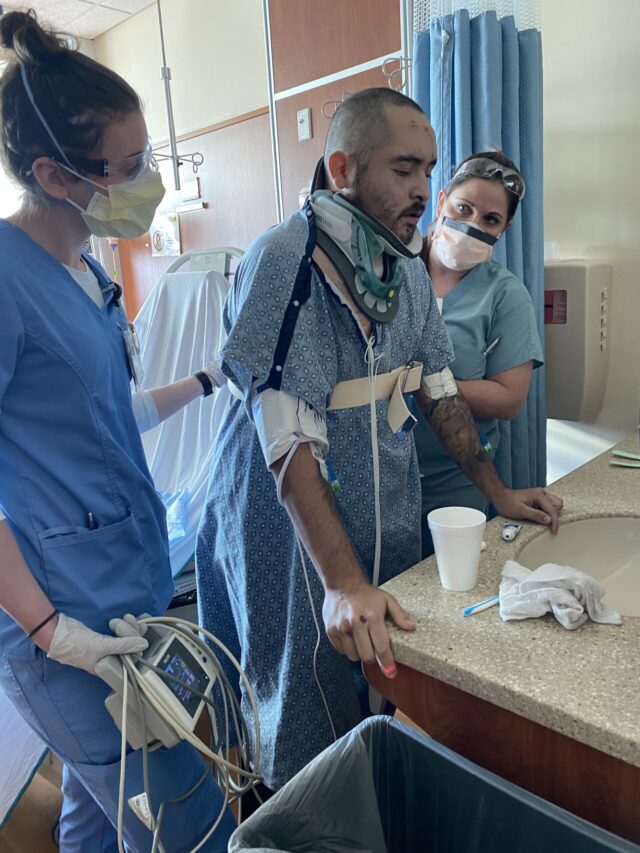
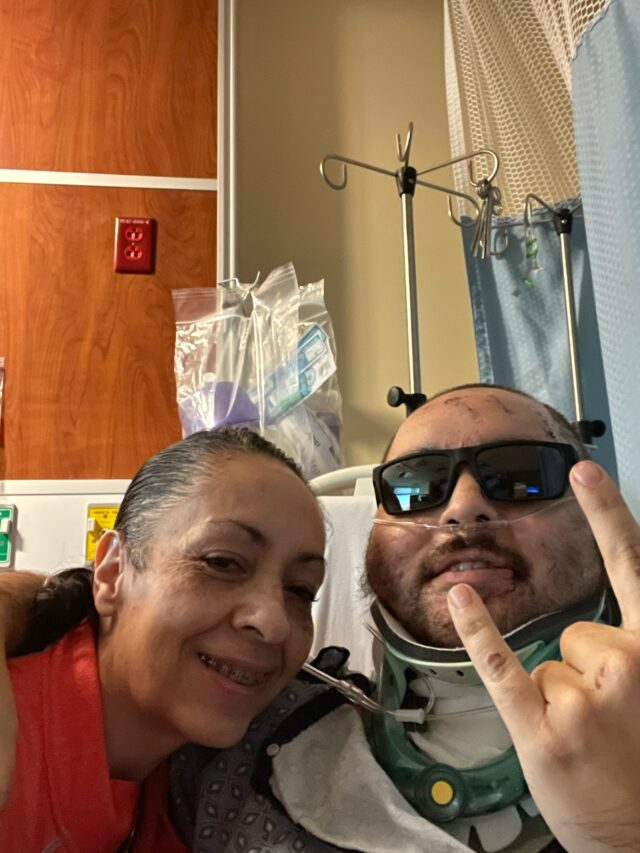
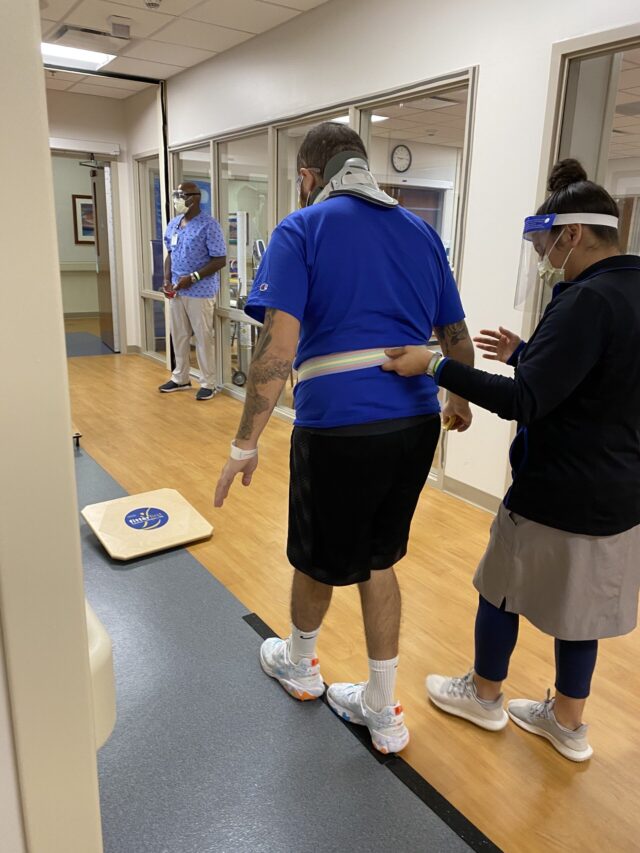
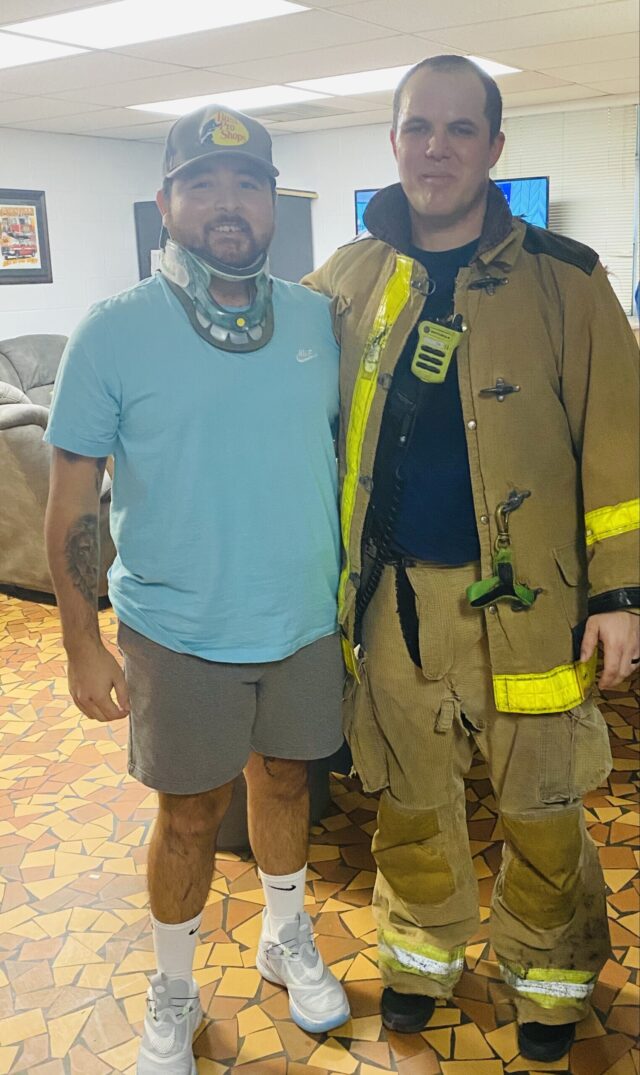
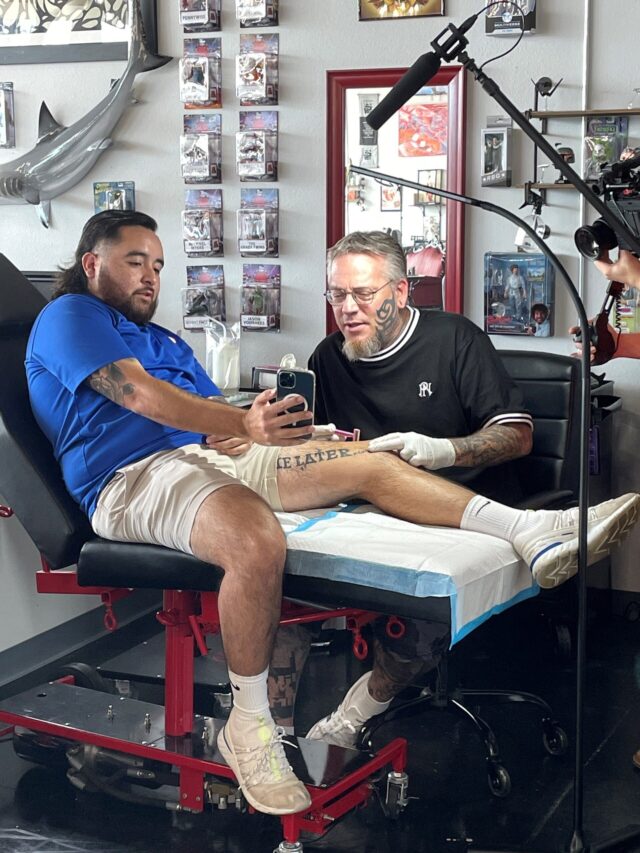
The two visitors, one from the police department and the other a victim advocate, asked Matt’s mom a chilling question about her son: Can you identify him with a tattoo? Denise told them Matt had a tattoo on his left thigh that fittingly reads “DIE LATER.”
Denise braced for the worst before she was hit with the jarring news.
“They told me that he was in a horrific motorcycle accident,” Denise said. “And they weren’t sure if he was going to make it because he had very bad injuries, and he was on life support.”
Denise then had to call an advocate in Denver to find out where her son was. She eventually reached two of Matt’s close friends in Florida who shed light on where he was within the UF Health Shands Trauma Center in Gainesville, the city with “a little of everything” that Matt fell in love with at an early age.
He was only 7 years old when his best friend showed him the Gators on TV and sparked his “obsession” with UF. Now, 17 years later, he was earning a bachelor’s degree at the university.
But at the moment, Matt was in a fight for his life with his family on the way.
A flight to Denver, then another to Atlanta, then one more to Gainesville. Along the way, Denise called the trauma center several times and each time the answer was the same: There was no change in Matt’s status; he was still on the ventilator.
When Denise, her sister Pamela and Gary arrived in Gainesville, one of Matt’s Pi Kappa Alpha fraternity brothers took them to the hospital. Once on Matt’s floor, though, Gary and Pamela had to stay behind because of COVID-19 restrictions.
Despite the frantic journey to get to his room, Denise stood frozen outside the door. One of the hardest things she’d ever have to see was a few feet away.
“I wanted to go to the bed, but I was scared, because I didn’t know what I was going to come to. When I walked to the bedside, I didn’t recognize my son. I did not recognize my son,” said Denise, fighting back tears. “He was hurt so bad. I never really knew how bad his head was hurt.”
The truth is, no one would know the extent of her nearly lifeless son’s injuries until he woke from his 14-day coma, and Matt’s doctors came into his room to inform Denise of that harsh reality the same day she arrived. He might be a quadriplegic. He might be permanently unresponsive. They just didn’t know.
The doctors’ hopes for Matt to even have basic function were slim. They figured he’d need a live-in nurse or his mother to care for him 24/7 for the rest of his life.
A Song and a Sign
Short memories and foggy flashbacks are all Matt can offer from his hazy stay in the hospital, but Denise’s recollection is crystal clear as she had been living minute by minute, anxiously waiting for a sign of life from her son.
Every day while Matt was in a coma, Denise — a nurse herself — talked to Matt and implored her son to fight. However, her own resolve was also being tested. Her husband also struggled, especially since he couldn’t be there to help his wife through what she described as “survival mode.”
“The hardest part for me was for his mom to go through that alone, seeing the condition Matt was in for the first time by herself,” Gary said. “Me not being able to be there for him or for her was even worse.”
Denise regularly called her family to FaceTime with them when she started noticing something. Matt’s vital signs would go up when they spoke, leading her to believe Matt could hear them.
Matt was on his way back.
One day, when Denise attempted to get a reaction from Matt by calling to him, he squeezed her hand tightly enough that she was able to lift it in the air to show the doctor.
He still hadn’t moved much beyond occasional arm jerks when UF Health Shands Arts in Medicine came to visit Matt and play him a song of Denise’s choosing. She had no idea how or why it popped into her head, but she picked “Tennessee Whiskey” by Chris Stapleton.
As it turns out, that was one of Matt’s favorite songs. To her shock, Matt was reacting to the song and even with his eyes closed, Denise still recognized a familiar face that he’s given her since a young age, which served to reassure her that he’d be OK. How the country classic came to mind is a mystery to her.
“It’s like I knew the password to his phone,” Denise said.
Pretty soon, the son who Denise calls a “prankster” was showing up.
Trauma ICU nurse Hannah Dawson, who was with Matt for most of his hospital stay, conducted neuro checks every hour. One time, she asked Matt to squeeze her hand, and he raised his middle finger at her. She laughed and told Denise that she and Matt would make good friends.
Her words couldn’t have been more prophetic as Dawson now calls Matt her best friend. The two even went trick-or-treating together this past Halloween with her kids.
“I’ve had hundreds of patients as a trauma ICU nurse, but for some reason, Matt and I became the best of friends, and I think it had a lot to do with me being there for a lot of his monumental moments in his recovery. I feel like it really bonded us. It’s a really unique circumstance," Dawson said.
Dawson was there when Matt eventually stood and took his first steps, the hardest part of his rehab. While Matt was far removed from his physically gifted days as a high school baseball, basketball and golf captain in Colorado, his recovery was ahead of schedule.
As a nurse whose job is to assist people in their darkest moments, Dawson has seen her fair share of patients who can’t experience a normal life again. Based on Matt’s condition when he arrived at the UF Health Shands Trauma Center and his first time working with occupational therapy and physical therapy, she thought Matt was going to be one of those heartbreaking cases
After being rushed to the trauma center that near fateful night of Nov. 7, Matt was discharged less than a month later, on Dec. 3.
“Seeing Matt now, it blows my mind,” Dawson said. “It almost brings me to tears, because it’s just so miraculous and speaks to our wonderful health care team.”
His Calling
UF Health trauma surgeon Martin Rosenthal felt the tap on his shoulder while he was helping a patient at 4 West, the trauma intensive care unit.
“You Dr. Rosenthal?” the person said, which confused Rosenthal for a second since his dad, a vascular surgeon, also goes by “Dr. Rosenthal.”
Matt introduced himself, but Rosenthal still had no idea who he was until Matt pulled the front of his shirt down to reveal the scar on his neck from the cricothyrotomy.
“My name’s Matt Benavidez, and you saved my life.”
Rosenthal still wasn’t sure who he was, which is normal for a trauma surgeon whose time with patients is up once they’re out of immediate danger. Plus, Matt’s face was no longer the swollen mess it had been when he was rushed to Rosenthal immediately after the motorcycle accident.
Once he did realize who was standing in front of him, a stunned Rosenthal said, “You’re talking to me, buddy!”
His amazement was a testament to Matt’s unfathomable recovery. The doctors were surprised with his short stay in the intensive care unit as it’s rare to see these types of patients get out of the ICU in two months. Matt was only hospitalized for 34 days and had made almost a full recovery in three months.
“For him to have the constellation of injuries that he had — including needing a surgical airway — the fact that he had such a meaningful recovery, I would’ve given him less than a 1% chance,” Rosenthal said.
If you ask Rosenthal whether his patient should’ve survived, he’ll tell you that’s a hard question to answer. However, if you ask him if Matt should’ve recovered the way he did, that’s an easy one. He’d safely answer no.
“To actually come back from a C2 cervical injury and have a pretty bad traumatic brain injury, typically you don’t come through unscathed,” Rosenthal said. “When you look at him, he doesn’t lateralize, he has no neuro deficits on right or left side, he can talk just fine.”
Rosenthal also points out that Matt has no deficits from a stroke he suffered on the operating room table while doctors rushed to address the bleeding in his brain. The surgeon further underscored how uncanny Matt’s recovery is by explaining his spotty recollection of both the incident and his recovery. Rosenthal attributes that to the magnitude of Matt’s traumatic brain injury and the amount of medications used to sedate him and keep his intracranial pressures down.
While Rosenthal helped save Matt’s life, he’s also given it meaning.
Matt was actually working as a support tech at 4 West when he came to thank his “hero.” He always wanted to be a critical-care anesthesiologist, but after shadowing Rosenthal in the trauma bay and operating room, that desire switched to becoming a trauma surgeon, so much so that he says it’s his “calling.”
“I think I was meant to be here in Gainesville, Florida. I think falling in love with the Gators at such a young age and being relentless about coming to UF and staying here, I think I was meant to be here. So, my plan is to go to medical school here at UF and be a doctor alongside Dr. Rosenthal at UF Health. That’s my plan, really.”
— Matt, who’s now working part-time at UF Health following his internship
Rosenthal, who was guided to medicine by his father, is happy to direct Matt now that he’s made it to the other side of the intersection.
“Medicine, you know, isn’t for everybody. He’s been guided by something bigger than all of us, not just me,” Rosenthal said. “I’m always happy to help mentor him in any decision he wants. He has shared with me numerous times that he wants to be a trauma surgeon as well, and we’d be happy to take him.”
The individuals Matt spoke with in his brush with the afterlife would’ve been happy to take him as well, but his decision was to “go back and work really, really hard.” That difficult road to recovery began right there under Rosenthal’s care in the trauma center, and as it turns out, that’s where Matt plans to stay.
“Embrace the Fight”
Christian Buckingham is no stranger to wild stories. Countless people have visited the well-known tattoo artist to get his help to share their incredible stories on their skin.
Still, the one that just walked through his door at Fallen Heroes tattoo parlor in Kissimmee, Florida, would rival those two decades’ worth of tall tales.
Matt has visited Christian several times, and he loves his work enough that he says he “won’t let anyone else touch him.” The two developed a friendship over the years, so Christian was aware of what happened to Matt, but the full story made his jaw drop.
“You look healthy. I don’t see what the big deal was,” joked Christian, who appeared on the TV show Ink Master. “I really expected you to be like hobbling in or something, like all pathetic looking. You look exactly like I remember.”
As Matt shared details of the accident with Christian, they continued to crack each other up. The two laughed about how “gnarly” Matt’s scar on his throat is and the rough shape his lip had been in. When Matt said the most tragic part about his accident was having to shave his head bald, Christian quipped by saying he’d need to get in another accident to get rid of the mullet that had already grown back with a vengeance.
“I think it’s easy to see the negative side of that and let it boost your fear of the world, but if you really look at it, I think it gives you more hope," Christian said. "Because I’ve seen people overcome crazy stuff, crazy stuff, like miracle kind of stuff. That’s the beautiful part — we get to tattoo those memorials and tributes.”
When it was all done, Matt would get “Embrace the fight” on his left knee with his time of death “19:56” right below. His already existing “DIE LATER” would get an update with an “… Again” underneath. Denise also got an “Embrace the fight” tattoo to match her son’s.
As Christian worked on Matt, he was shown a short video in which a debilitated Matt is barely able to walk before it quickly cuts to Matt walking across the stage at UF to graduate on Aug. 7, 2021, exactly nine months from the day of his accident.
While that was a huge moment in his life, Matt has also come to appreciate the little things. He enjoys the rain. He loves sleeping in a king-sized bed even though his beloved English bulldog Fred makes him feel like it’s a twin. He also likes reading out loud since he couldn’t before while dealing with aphasia in the immediate aftermath of the accident.
All those things were seemingly taken from him in that spot on the road. Now, Matt’s mission is to help others at the intersection of life and death, on the brink like he was.
“I think we’re all given something in our lives that tests us, and there’s three results out of it,” Matt said. “It either destroys you, kills you or embraces you. You have an option of what you want to do. You’re here for a reason, and you get that task for a reason, because you’re strong enough to go through it. You just have to embrace the fight."

UF Health Shands Emergency Room/Trauma Center
The UF Health Shands E.R. is co-located with the UF Health Shands Trauma Center, the area’s only Level I facility, that sees both adult and pediatric trauma patients.
About the author

